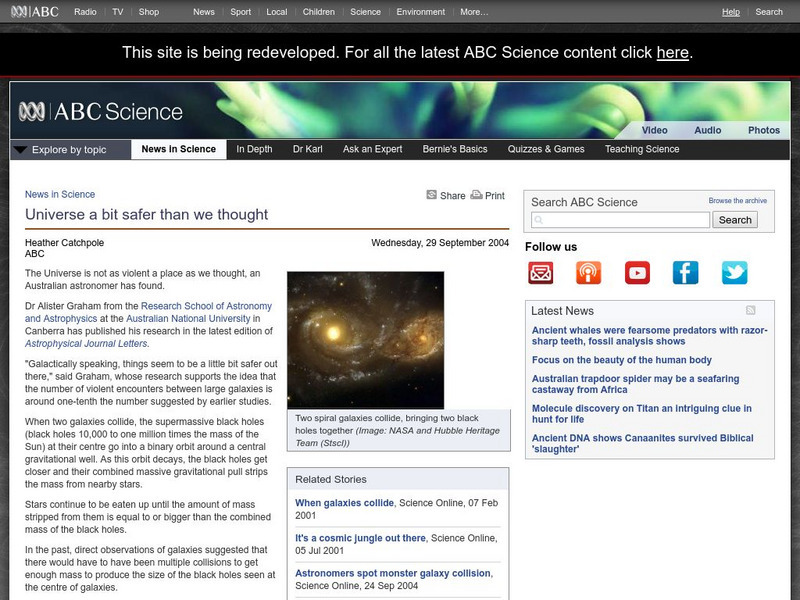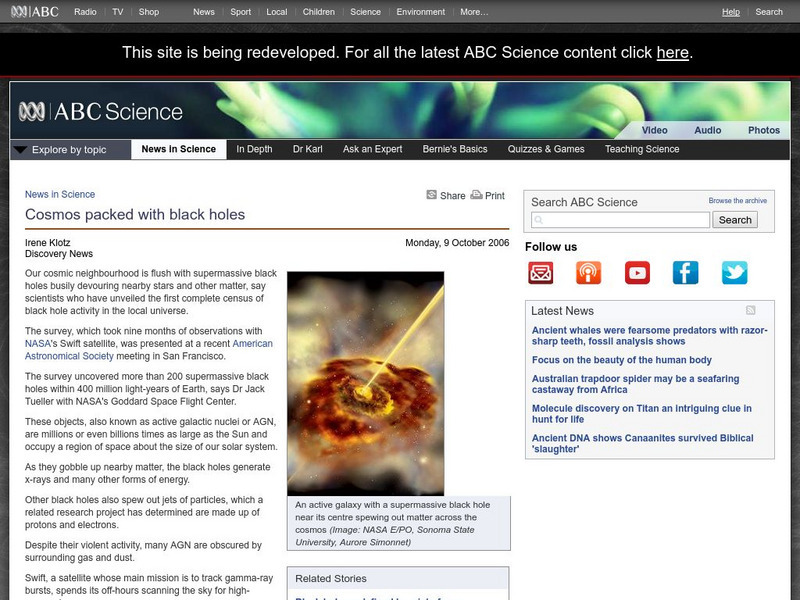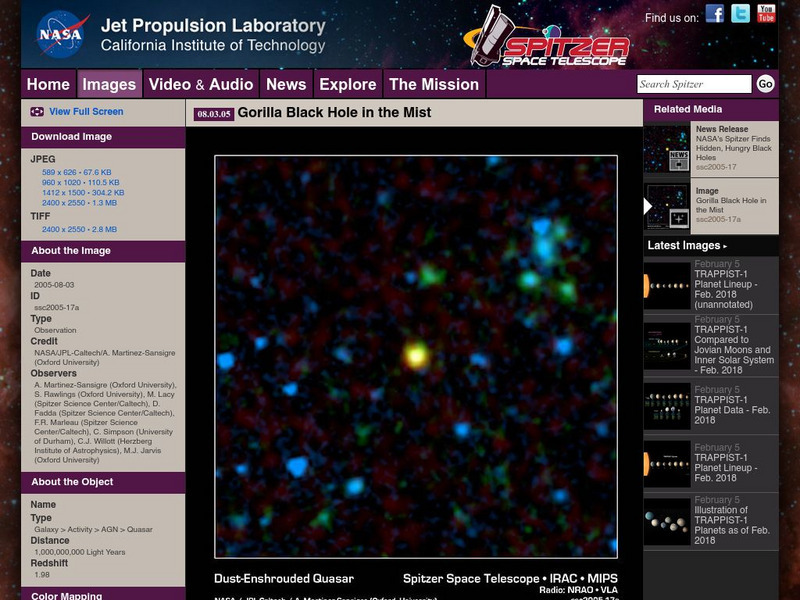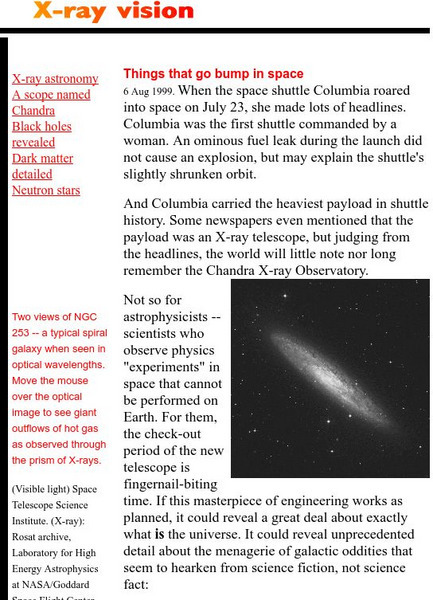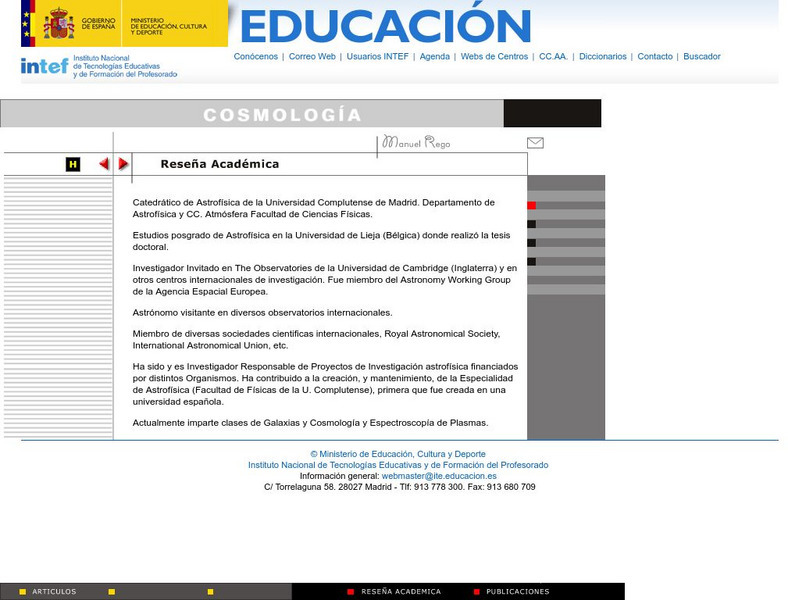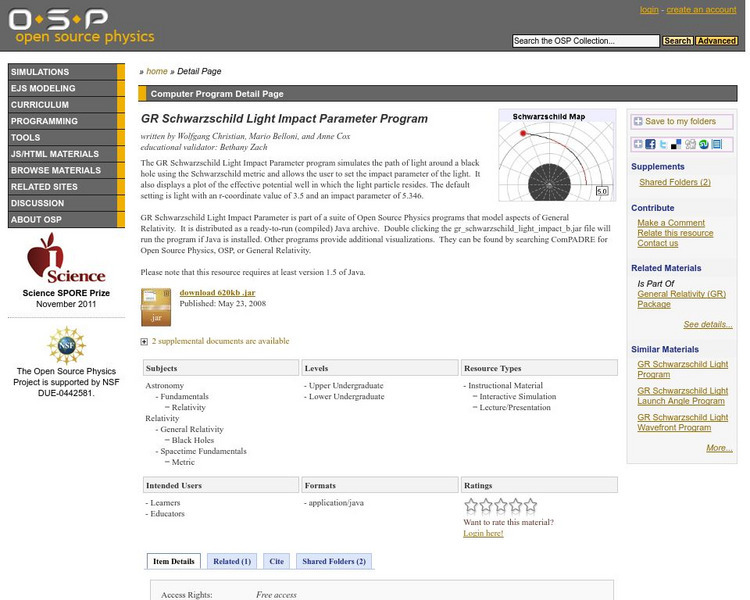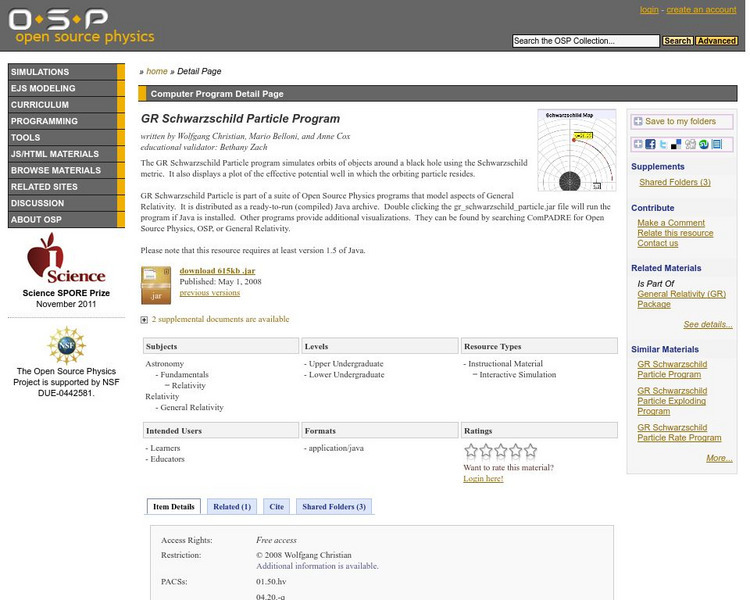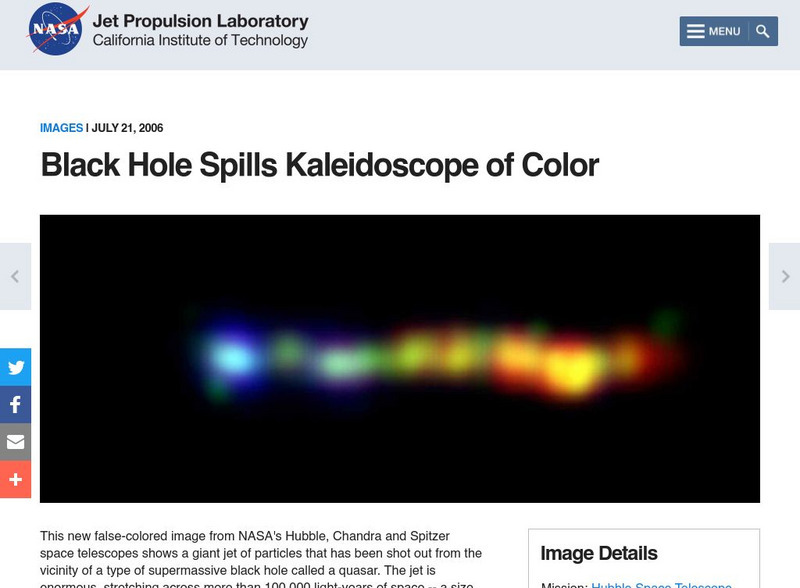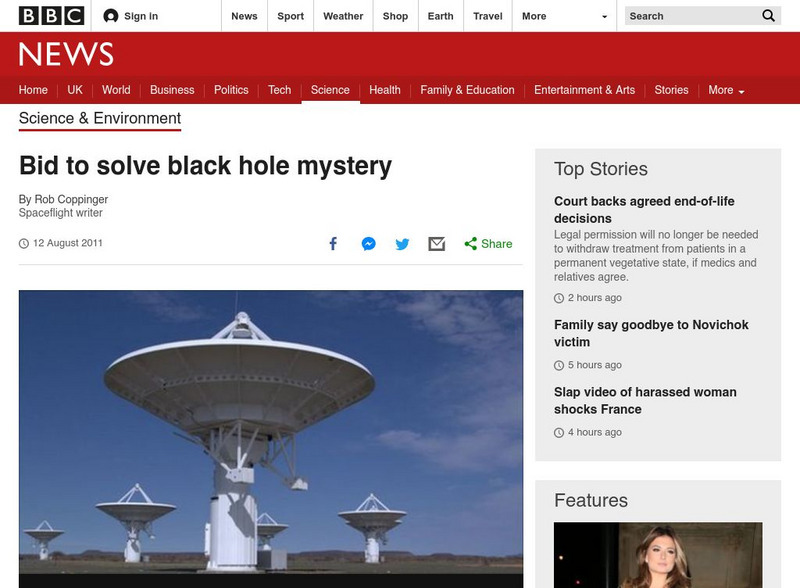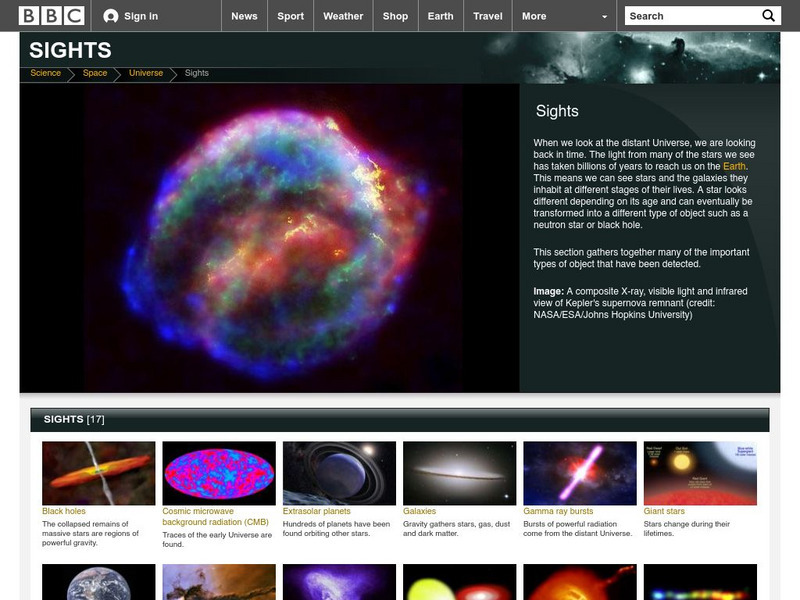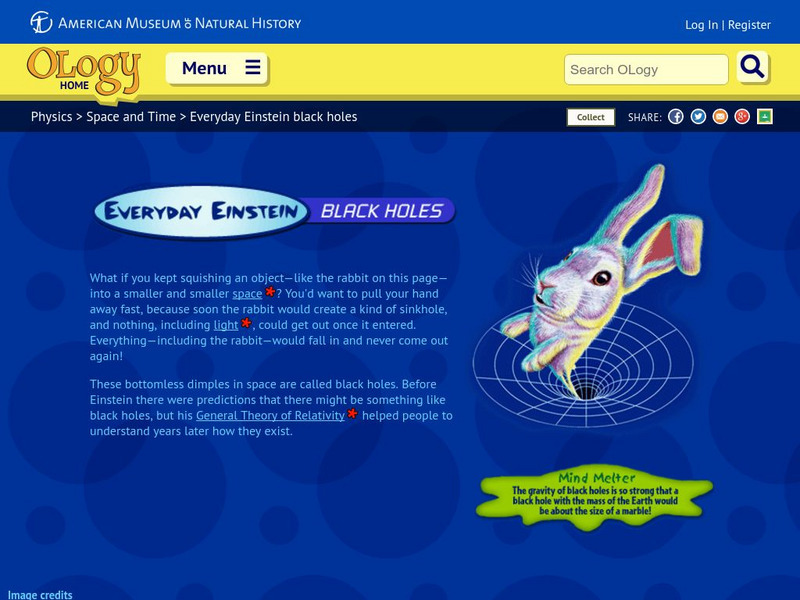Space Telescope Science Institute
Hubblesite: Hubble Finds a New Black Hole
From NASA's Hubblesite, photographs of a black hole taken with the Hubble telescope. Includes explanatory press release.
NASA
Nasa: Imagine the Universe: Pulsars
Resource explores what a pulsar is, as well as what is currently known about this phenomenon. Content includes a focus on x-ray observations of pulsars, and gamma-ray pulsars.
Space.com
Space: Astronomers Surprised: Stars Born Near Black Hole
Black holes seem to be a constant point of debate for astronomers. This article confirms the theory that black holes can help form massive stars and gives more support to the idea that black holes play a big role in galaxy formation....
Space.com
Space: Astronomers Surprised: Stars Born Near Black Hole
Black holes seem to be a constant point of debate for astronomers. This article confirms the theory that black holes can help form massive stars and gives more support to the idea that black holes play a big role in galaxy formation....
NASA
Nasa Space Place: What Is a Supernova?
Discover interesting facts about supernovas, what causes them, how bright they are, and how do scientists study them.
Australian Broadcasting Corporation
Australian Broadcasting Corporation: News in Science: Universe a Bit Safer Than We Thought
From ABC News in Science, Heather Catchpole's article explores issues related to the collision of galaxies and the subsequent formation of black holes.
European Space Agency
European Space Agency: Esa Kids: Our Universe: Black Holes
Brief one-page explanation of a black hole.
Australian Broadcasting Corporation
Australian Broadcasting Corporation: News in Science: Cosmos Packed With Black Holes
From ABC News in Science, Irene Klotz's article explores the abundance of black holes in the Cosmos currently at work "devouring nearby stars and other matter."
California Institute of Technology
Spitzer Science Center: Gorilla Black Hole in the Mist
The Gorilla Black Hole in the Mist image features a distant galaxy with a quasar and a super-massive black hole. In addition, a detailed textual overview explains various specifics of the picture.
University of Wisconsin
The Why Files: Things That Go Bump in Space
Contains an introduction to x-ray astronomy, describing how x-rays are being used by scientists to learn about the universe. Also contains links to sites describing black holes, dark matter, neutron stars, and how they are investigated...
Ministerio de Educación (Spain)
Ministerio De Educacion: Cosmologia
This site has many articles from the first moments of life of the universe to its properties, current models, black holes, galaxies, etc.
American Association of Physics Teachers
Com Padre Digital Library: Open Source Physics: Schwarzschild Light Launch Angle
Visualization that uses the Schwarzschild metric, showing the path light travels near a black hole depending on the angle of its initial launch.
American Association of Physics Teachers
Com Padre Digital Library: Open Source Physics: Schwarzschild Light Impact
Visualization using the Schwarzschild metric, showing the path light travels near a black hole. Adjust the impact parameter and observe effective potential well of the light particle.
American Association of Physics Teachers
Com Padre Digital Library: Open Source Physics: Schwarzschild Particle Program
Visualization using the Schwarzschild metric, showing the behavior of an object as it orbits about a black hole.
Other
American Institute Physics: Quark Stars
Collapsed stars, between white dwarfs and black holes, can be studied as quark-gluon masses, or quark-hyperon groups. Extreme pressures lead to extreme states.
Treehut
Suzy's World: Black Holes
Use this site to find out what is a black hole in space and try an experiment.
NASA
Nasa: Imagine the Universe: "Nasa Detects One of Closest"
Site provides the article, "NASA Detects One Of Closest And Brightest Gamma Ray Bursts." Provides links to learn more about gamma rays and black holes as well as other resources.
NASA
Nasa: Imagine the Universe: X Ray Binary Stars
Site provides a brief introduction to binary stars. Additional resources for students and teachers on this topic are offered as well as related topics.
NASA
Nasa: Black Hole Spills Color
Under the heading, "Black Hole Spills Kaleidoscope of Color" this site examines specific details of an image displaying the "supermassive black hole called a quasar."
BBC
Bbc Science & Nature: Black Holes and Time Travel
This article describes how black holes may provide clues to the possibility of time travel and parallel universes.
BBC
Bbc: Wormholes
The BBC reveals what is known about wormholes, a possible consequence of Einstein's Theory of General Relativity in which space is bent, opening up the possibility of time travel.
NASA
Nasa: Marshall Space Flight Center: Chandra
NASA's Chandra X-ray Observatory site features a photograph and explanation of a "cool" black hole in the Andromeda Galaxy (M31).
American Museum of Natural History
American Museum of Natural History: O Logy: Black Holes
This is a brief explanation of black holes. Click the starred words to see interactive flashcards with more information.






